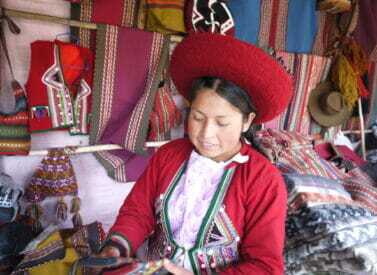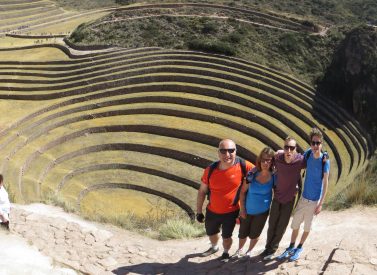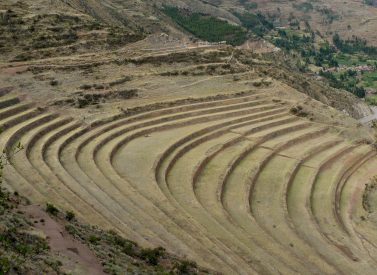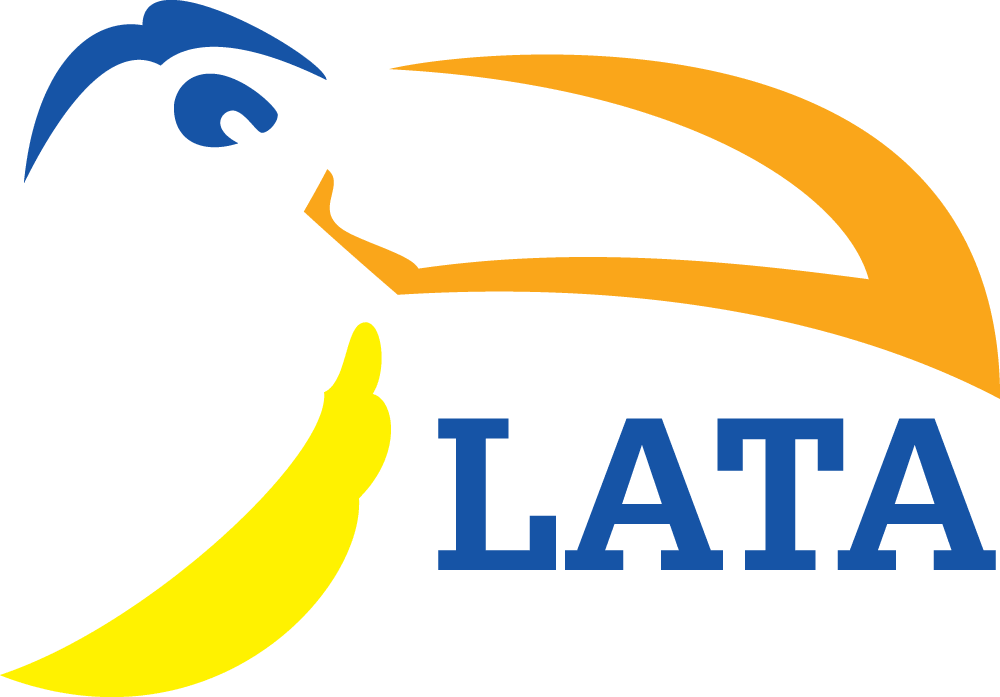How Farming Fights Food Insecurity & Climate Change
 by Tom Shearman on 21st November, 2023
by Tom Shearman on 21st November, 2023
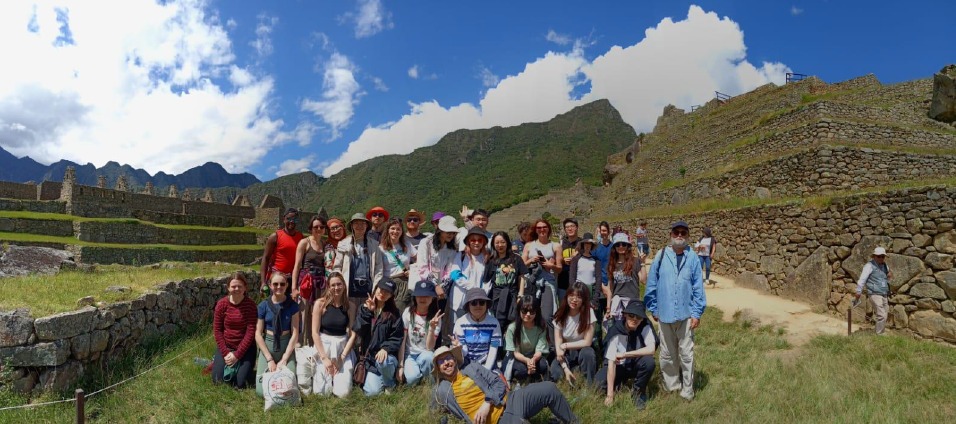
Students Study Food Insecurity & Climate Change in Peru
University of Edinburgh students and teachers report back from Peru, where they learned how traditional farming techniques could help prevent climate change and reduce food insecurity.
The team visited coastal Lima, the Cusco Highlands, and the cloud forest. For Andean Trails and our local team, it was a chance to showcase a side of Peru that many visitors may not see when passing through.
It went so well that the University has already signed up its team to another Food Security tour in the spring of 2024.
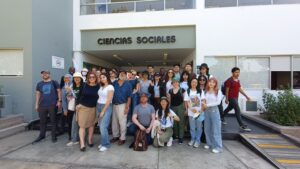
Learning About Local Produce and Mitigating Climate Change in Lima
With a reputed 4,000+ varieties of potatoes in Peru, the trip started, fittingly, with a visit to the International Potato Centre. Presentations explained how biodiversity within agricultural systems in the Andes could help mitigate some of the effects of global warming and food insecurity.
Next, the visitors learned how Peruvian rainforest fruits like the tart and nutritious camu camu are being farmed sustainably to avoid deforestation of the Amazon.
Coffee and cocoa are two of Peru’s most important exports. Naturally, the group were delighted to sample some at Café Ciclos while listening to seminars about food security. The Lima tours finished with demonstrations of projects to help remote rural communities maintain food security while preserving the environment.
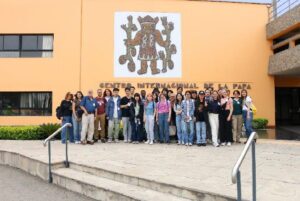
Cusco and the Sacred Valley
The famous Sacred Valley, the breadbasket of the Incas, is still vital to Peru’s food security.
Moreover, modern farming techniques are altering native potato varieties to boost their nutritional value. More tastings followed. Particularly popular was the multi-coloured display of oven-baked potato chips slathered in the local Huacatay chilli sauce.
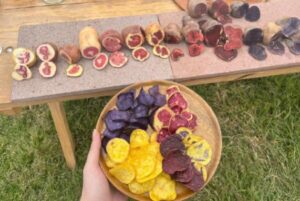
Stepping back into the past, the team visited the ancient, pre-Inca salt mines at Maras. Next was a trip to the ‘Inca greenhouse’ at Moray. Here, a series of rounded terraces have been built into the mountainside. The Incas used the different temperatures at varying altitudes to establish which crops would thrive and where.
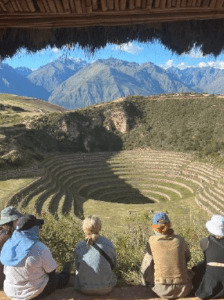
Visits to a bee sanctuary and permaculture centre followed. Students learned about the importance of maintaining healthy bee populations and protecting soils, as well as bacteria’s role in making great compost, and which minerals to add to the earth. This concluded the first part of the Cusco area visit.
Tea Growers in Urubamba, Peru
Obviously, Peru is famous for its coffee, but did you know about its tea industry? A tea plantation in the Urubamba Valley hosted the team, giving them the chance to make different teas. They also learned how to blend the teas with medicinal herbs to boost their effectiveness.
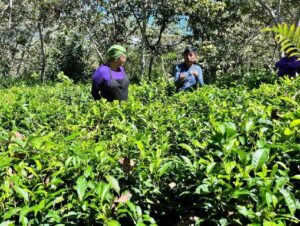
The Muyu Project, a self-sustaining ecological farm in the same valley, allowed the visitors to get their hands dirty. The team prepped soils, checked mushrooms, planted roots, and dried fruits.
The ancient Inca capital of Cusco was the journey’s next destination with a stop at the Cuyuni community on the outskirts. Modern met tradition as the group saw how the community has been striving to improve agricultural techniques and livestock (including guinea pig and camelids) management, save water, and diversify with orchard and mushroom growing.
As a farewell, the Cuyuni community performed ancient rituals to thank the land (Pacha Mama) for providing food. This ceremony gave students a glimpse into the crucial relationship between the people and the land.
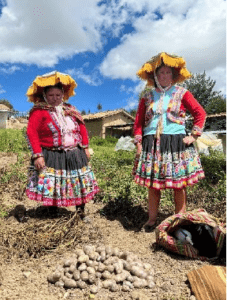
Cusco and Its Traditional Markets
From seeing production to sales, the final trip was to Cusco’s impressive San Pedro market. This traditional market showcases the fertile mountains and rainforests surrounding Cusco. A panoply of fresh fruit and vegetables, complemented by meat, provide sustenance to residents and visitors to the city.
Finally the group participated in a talk at Bartolome de las Casas Centre from anthropologist Cecilia Sueiro about their work in trying to improve rural communities through farming.
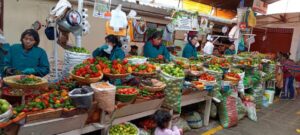
Dr Montse Costa-Font, one of four University of Edinburgh staff on the tour, said: “Overall, the visit exposed the students to several topics related to food security, sustainability and rural development.
“They saw the importance of local production and the integration of ancestral agricultural practices within modern agriculture. There was the chance to see how different food supply chains operate and the role of supporting rural communities with participatory training.
“We would like to thank Kathy from Andean Trails and her associated team in Peru—Alejandro, Myrta, Eloy, Octavio and drivers Juan and Carlos—who made the experience smooth and enjoyable.”
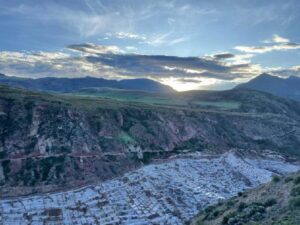
Returning to Peru Next Year
Andean Trails will support the University of Edinburgh team once more when they head to Peru again in April 2024. The trip forms part of the University of Edinburgh/SRUC Master in Food Security.
To finish off, Dr Costa-Font said: “Agradiseyki, anchata yupaychaykuyki,” which means, ‘Thank you; we greatly appreciated it.’
The University of Edinburgh: Food Security Academic Tour Outline Itinerary
Overall, we provided all meals and accommodation included from dinner on day one to breakfast on departure day.
- Day 1 Arrive in Lima, transfer to hotel, welcome dinner.
- Days 2-3 Lima visits.
- Day 4 Transfer to airport, fly to Cusco, visit Maras and Moray, stay in Urubamba.
- Days 5-6 Explore Sacred Valley, bee sanctuary, tea plantation and more.
- Days 7-8 Guided visit to Machu Picchu with a ‘living lab’ visit en route.
- Day 9 Cuyuni community visit with ancient rituals then explore Cusco.
- Day 10 Cusco market tours, transfer to airport, fly to Lima and to UK.
- Day 11 Land UK.
Been inspired?
We can cater for all group tours, from schools to universities and clubs. Let us know of any specific interests and we’ll find the best route and guides to make it work for you. Contact us for more.



 a Tailor Made Tour
a Tailor Made Tour 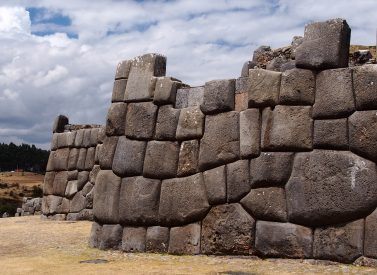


 a Group Tour
a Group Tour 